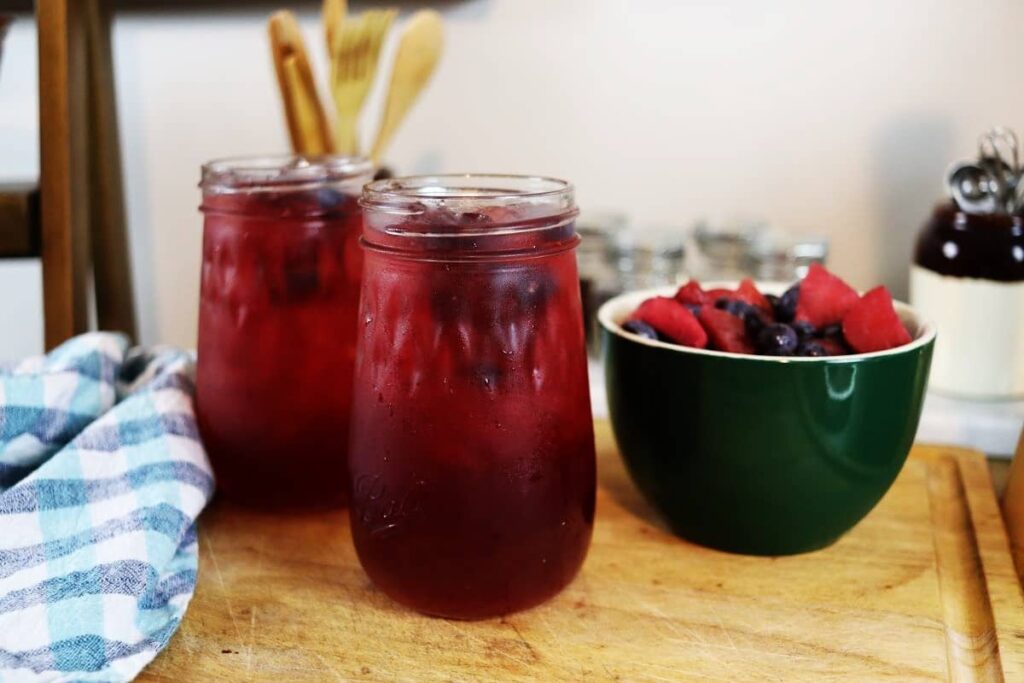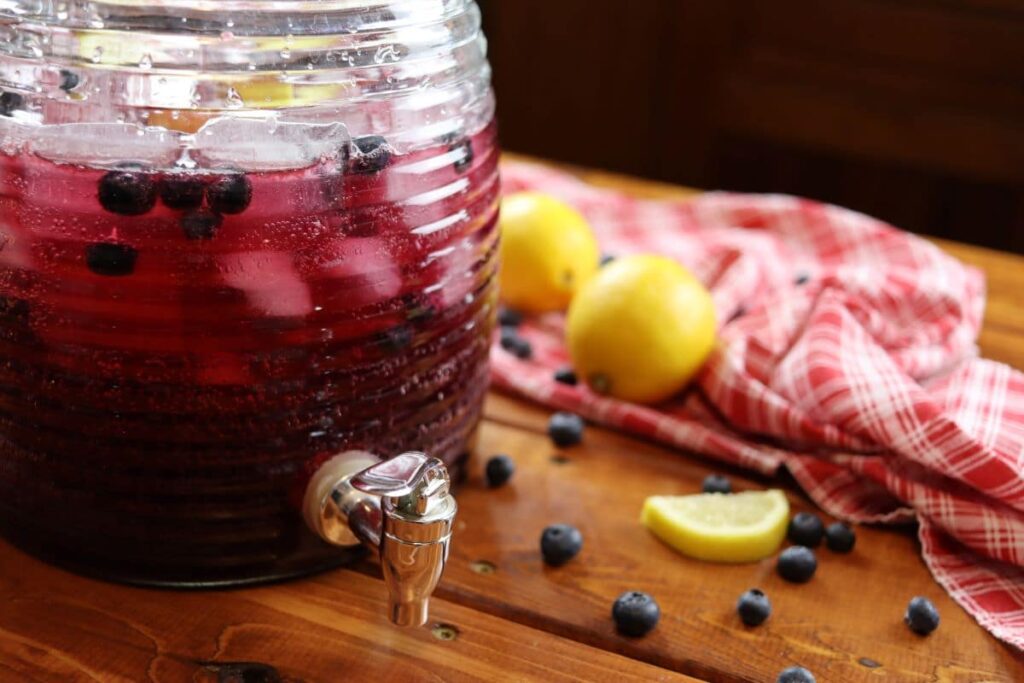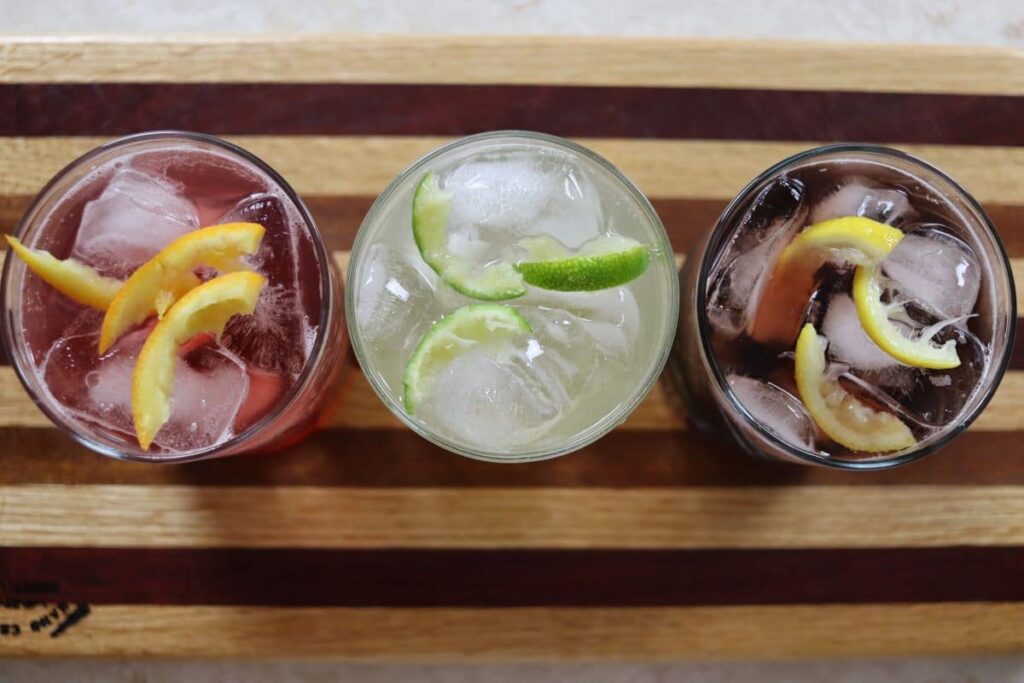Fruit Kvass || Easy Fermented Berry Drink
This simple fruit kvass recipe is a great introduction to homemade fermented drinks. Made with fresh berries, honey, and water, it transforms into a fizzy, slightly sweet beverage in just a day or two.
Interested in more easy ferments? Check out my Fermented Almond Milk Recipe.

Introduction
Kvass is an Old World beverage with roots in Eastern Europe. While traditionally made from ingredients like rye bread or beets, the fruit-based version is lighter in flavor and incredibly easy to make. I had a surplus of strawberries and blueberries, so I gave it a go – and I’m glad I did.
This recipe requires minimal effort and uses simple tools: a glass jar, a bit of fruit, and a touch of natural sweetener. It comes together quickly and ferments in just 24–48 hours. You can enjoy it on its own or serve it chilled over ice for a summer refresher.
Why This Recipe Works
- Quick ferment – ready in 1–2 days.
- Uses fruit you already have on hand – even scraps.
- No added yeast needed – wild yeasts do the work.
- Mild and fruity flavor – that appeals to a wide range of tastes.
- Flexible batch size – works in quart or gallon jars.
Ingredients For Fruit Kvass

All you need is a few kitchen staples and a little time.
- Fresh Fruit: Blueberries, strawberries, or any ripe seasonal fruit work well.
- Fresh Ginger (optional): Adds a subtle spice to the flavor.
- Honey: Helps fuel fermentation; maple syrup can also be used.
- Water: Use filtered or well water for best results.
See recipe card below for full information on ingredients and quantities.
Would you like to save this post for later?
Variations or Substitutions
- Swap berries for stone fruits, apples, or citrus.
- Use fruit scraps like peels and cores to reduce waste.
- Add herbs like mint, basil, or lemon balm.
- Try a splash of lemon or lime juice after fermenting for brightness.
- Leave out the ginger if you prefer a purely fruity flavor.
How To Make Fruit Kvass
Gather the ingredients for this recipe.
- Prep the fruit:
Cut or mash the berries to expose the insides and help release flavor.
- Slice the ginger:
Thinly slice fresh ginger and place it into a clean glass jar.
- Add fruit and honey:
Fill the jar about two-thirds full with the prepared fruit, then pour in the honey.

- Top with water:
Add water to the jar, leaving at least 1 inch of headspace at the top.
- Cover the jar:
Use a fermentation lid or a plastic lid that’s loosely sealed to allow gases to escape.

- Shake daily:
Shake the jar gently twice a day to prevent surface spoilage and encourage fermentation.
- Ferment at room temperature:
Let sit at room temperature for 24–48 hours until lightly fizzy and tangy.
- Strain and chill:
Once fermented to your liking, strain the liquid and refrigerate.

Recipe FAQs
When you see bubbles and the flavor has a mild tang, it’s done.
Yes, thaw first and then use as you would fresh.
Only trace amounts develop naturally during fermentation.
Refrigerated kvass keeps for up to a week. Carbonation may fade over time.
Serve
Serve fruit kvass cold, over ice, or in a small glass with a slice of citrus. It’s a naturally fizzy, refreshing option for warm weather or anytime you want a non-caffeinated, homemade beverage. Try adding it to mocktails or pairing it with light meals like summer salads or roasted vegetables.

Expert Tips
- Use ripe, unbruised fruit: Fresh, ripe berries provide the best flavor and natural sugars to support fermentation.
- Keep out of direct sunlight: Store the jar in a cool, dark spot to help control the fermentation process.
- Leave headspace: Always leave at least 1 inch of space at the top of the jar to prevent overflow during fermentation.
- Track fermentation: Label jars with the start date and taste daily after the first 24 hours to find your preferred tanginess.
- Account for temperature: Fermentation time varies — warmer rooms speed it up, so check flavor more frequently in warmer months.
- Experiment with flavors: Try swapping out berries or adding herbs like mint or basil for a fresh twist.

Fruit Kvass
Equipment
- Quart size mason jar
- Sharp knife and cutting board
- Fermenting lid or plastic lid
- Plate to catch overflow
- Fine mesh strainer
Ingredients
- 3/4 cup blueberries
- 3/4 cup strawberries
- 2 tsps fresh ginger
- 1 tbls honey
- 1 1/2 cups water
Instructions
- Prep ingredients: Rinse and cut strawberries and blueberries. Peel and slice ginger.
- Add to jar: Place berries in a quart jar, filling it about 2/3 full.
- Add remaining ingredients: Add ginger and honey, then fill the jar with water, leaving 1" headspace.
- Seal jar: Cover with a fermenting lid or a loosely tightened plastic lid.
- Set to ferment: Place jar on a plate to catch overflow and leave at room temperature.
- Agitate daily: Shake gently twice a day to prevent mold and encourage fermentation.
- Burp if needed: If using a plastic lid, loosen briefly once daily to release gases, then re-tighten.
- Check for fizz: After 2–4 days, once bubbles form and flavor is tangy, it’s ready.
- Strain and store: Strain fruit and transfer kvass to a clean jar or bottle. Refrigerate and enjoy cold.
Notes
-
- Use ripe, unbruised fruit: Fresh, ripe berries provide the best flavor and natural sugars to support fermentation.
- Keep out of direct sunlight: Store the jar in a cool, dark spot to help control the fermentation process.
- Leave headspace: Always leave at least 1 inch of space at the top of the jar to prevent overflow during fermentation.
- Track fermentation: Label jars with the start date and taste daily after the first 24 hours to find your preferred tanginess.
- Account for temperature: Fermentation time varies — warmer rooms speed it up, so check flavor more frequently in warmer months.
- Experiment with flavors: Try swapping out berries or adding herbs like mint or basil for a fresh twist.





Can a metal lid work or a tight plastic wrap?
Hi Veronica!
You can use any lid to make this recipe. I used a fermenting lid with a metal ring because I find it the nicest way to go. But use what you’ve got, of course. If you use a metal lid and ring or a plastic lid just set it on the jar loosely to allow the gases to escape.
Wondering if I could use small wild red plum puree? I had an abundance of these plums so I pressed them through a colander to express the pulp and juice. Could I use this to make kvass? Wondering the quantities I should use? I do have one gallon jars, and I’d like to make a lot to use up the pulp – otherwise I’ll freeze it. Thanks!
I honestly don’t know if puree can be used to make kvass. I wish I could be more help.
This fruit kvass is such a refreshing and naturally fizzy way to enjoy the benefits of fermentation — lightly sweet, gently tart, and so easy to make at home. It’s a wonderful introduction to fermented drinks if you’re just getting started! If you try this recipe, I’d love to hear how it turned out. Feel free to leave a comment or ask any questions — I’m here to help as you get brewing!